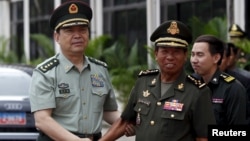U.S. officials have said that Cambodia’s postponement of the annual military exercise Angkor Sentinel will not impact on security assistance to the country.
But analysts say Cambodia risks alienating the United States as it continues to firm up its ties with China.
The Angkor Sentinel exercises have been held in Cambodia for almost a decade, but this year the Ministry of Defense told the U.S. It was delaying the scheduled event due to preparations for the local elections that are coming up in June.
Jay Raman, U.S. Embassy spokesman, said that other “military exchanges and training programs with Cambodia are not affected.”
But Chheang Vannarith, president of the Cambodian Institute for Strategic Studies, said the postponing of the exercise would affect Cambodia’s defense capacity and its hedging strategy.
He explained that the Cambodian People’s Party has tried to distance Cambodia from the U.S., and that the cancellation of this year’s exercise was the latest example.
“The ruling party has deeply, strategically aligned Cambodia with China while gradually distancing Cambodia from the US. Cambodia's destiny attaches to China,” he wrote in an email.
The postponement of the joint military exercise between Cambodia’s army and the U.S. came after Cambodia carried out its first ever exercise with China in late 2016.
Ou Virak, president of Future Forum think-tank, said on Thursday that Cambodia’s military would suffer as a result.
“What I am concerned by the most is the losing of balance [between the two super powers], which would reflect that Cambodia’s biased. This would affect Cambodia’s stability in the long term,” he said.
Although analysts offered mixed views on the consequences, the head of Cambodia’s military defended the move, explaining that Cambodia’s army is preparing for the upcoming elections.
Defense Minister Tea Banh told reporters after the annual meeting of the Royal Cambodian Armed Forces that Cambodia’s army would be too busy to take part in the training.
He added that the most important work for Cambodia’s army to do was to maintain stability during an election period.
“The military side must complete its task, meaning to do whatever to keep stability and make the environment better for the election to go ahead, fair and free for all,” he said.






